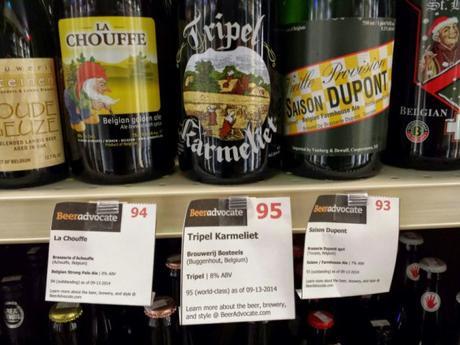
We are all unique snowflakes.
We pride ourselves for the power of individual thought. Nobody else is like us. Nobody else can influence us.
We do what we want, what we like and what we need.
Except when we don't.
In a roundabout way, this reasoning was the at core of one of my recent stories now online for All About Beer, exploring what might impact beer lovers when they go shopping.
More often than not, my friends and fellow beer acquaintances tell me they choose beers solely on their own preference. Choices aren't made based on what somebody else may tell them and definitely not led on by rating systems provided by websites like Beer Advocate and Rate Beer.
But the fact of the matter is, they kind of are. And for the vast majority of beer drinkers who aren't deep in the hoppy weeds of styles, IBUs or brewing know-how, they definitely are.
"Crowdsourced ratings can be really valuable because the best predictor of what someone will like is what other people will like," I was told by Jack Soll, associate professor of management at Duke University's Fuqua School of Business, whose research focuses on psychology of judgment and decision making. "These ratings can be very influential, especially for people who consider themselves less of an expert."
For those that do think themselves as experts - or at least knowledgeable - beer ratings may not always present enough pull to make them choose something new or different, but they are probably used to reinforce ingrained opinions:
Even if we want to seek out help or insight, we still hold our own opinions in high regard: "One's judgments are part of oneself and, like possessions, letting go of them is painful."
That's why the use of rating websites isn't just easy, but comfortable. We seek out information or opinions that mirror our own, allowing us to feel stronger in our final choice.
This doesn't consider the psychological impact of something like can and bottle labels, which have their own influence on how we imagine and perceive quality.
But the fact of the matter is, it was easy for me to find in my reporting several examples of companies, distributors or breweries confirming that the use of beer ratings and informational tags in bottle shops impacted consumer behavior. The only surprise I came across was that these examples were anecdotal - even the national chain of Total Wine & More doesn't track sales of beers that had info tags compared to those that don't. Seems like an opportunity lost.
So really, those tags you see out on the shelf really are doing work on us. They're presenting information on all sorts of aspects of a beer, allowing our brains to give considerations to a beer's biographical data. In turn, shoppers are weighing what that means with how they spend their money or what they want to check in on Untappd.
Don't forget: you are a unique snowflake. Just like everybody else.
 Learn more about how informational tags - also know as shelf talkers - may influence beer purchases in my story for All About Beer, Numbers Game.
Learn more about how informational tags - also know as shelf talkers - may influence beer purchases in my story for All About Beer, Numbers Game. Bryan Roth
"Don't drink to get drunk. Drink to enjoy life." - Jack Kerouac

